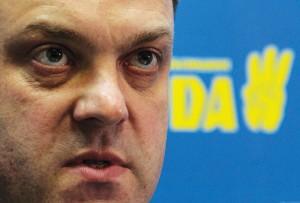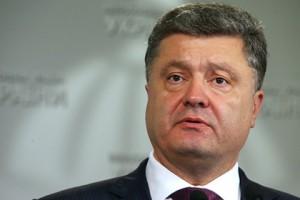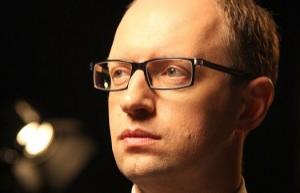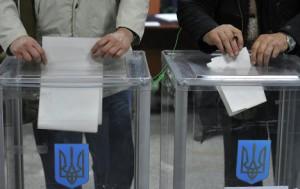Ukraine’s vote proves Putin wrong and puts anti-Semitic past behind
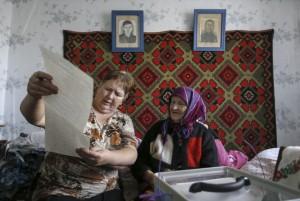
By John Lloyd (Reuters) — One of the themes that Russian President Vladimir Putin tried out to besmirch the Ukrainian revolt against pro-Russian President Viktor Yanukovich earlier this year was that fascists and anti-Semites were behind the uprising. The protesters, he proclaimed, were revolting in both senses of the word: They had chased out an elected president (true) and their actions had allowed “anti-Semitic forces [to go] on a rampage” (not true).
We now have facts on the ground that Putin’s conspiracy theory is vicious nonsense. More than 40 percent of the vote in this past weekend’s parliamentary elections in Ukraine went to two liberal, pro- European parties, one headed by President Petro Poroshenko, the other by Prime Minister Arseniy Yatsenyuk. A third party, the Lviv-based Samopomich (Self-Help) Party, also strongly pro-European, polled more than 10 percent.
Only one party that could be accurately labelled far right, the Radical Party, exceeded the 5 percent threshold necessary to gain parliamentary seats. The most radically right party, Svoboda (Freedom), didn’t make the cut. The Opposition Bloc, which had been a major part of the coalition that supported Yanukovich, attracted about 10 percent of the votes.
There are caveats to this picture. Voters in the heavily populated Donbass region in eastern Ukraine didn’t go to the polls, and a referendum on the region’s self-rule is set for Nov. 2, which could lead it to secede from Ukraine. Sergei Lavrov, the Russian foreign minister, said Russia would “of course” recognize the results.
In addition, Ukraine, like many shaky democratic states, doesn’t have a settled party structure; political parties are more like support groups for leading politicians than membership organizations with roots in society. The one party with such roots, the Communists, didn’t get into parliament – for the first time since the country’s independence. So new parties can garner a flashflood of votes, and just as quickly lose them.
Nevertheless, Ukrainians’ choice of the European Union over Russia is clear enough. But if the EU can’t be more proactive in providing economic and other assistance to their deeply wounded country, that may change.
Ukraine also seems to have put something else behind it – its longstanding reputation as a killing ground for Jews. That centuries-old miasma of slaughter is exactly what Putin called to mind with his conspiracy comments. It is so powerful, because it has been so awful.
The Nazi invasion, from June 1941 on, was an efficiently organized murder spree. At Babi Yar, a ravine on the outskirts of Kiev, more than 33,000 Jews were killed in just two days in September of that year. All told, nearly 1 million Ukrainian Jews were murdered in the Nazi period. But the matter doesn’t end there. Thousands of Ukrainians enrolled in the auxiliary police, or Schutzmannschaft Battalions, to assist the Nazis in finding and killing Jews. Some 300 took part in the massacres at Babi Yar.
There is more darkness in Ukrainian history. In the 17th century, the famed Cossack leader Bohdan Khlemnytsky roused the peasants against their Polish landlords and overseers. The Jews, who often worked as estate managers and tax collectors and who were seen as allied with the Poles, were slaughtered by the tens of thousands. Later on, with the formation of the Pale of Settlement in the latter part of the 19th century, which included most of Ukraine, murderous rampages against Jews and the burning of their towns were commonplace. And after the collapse of Russian imperial power in 1917, Symon Petliura, who led a brief and doomed nationalist uprising against both the Reds (the Bolsheviks) and the Whites (the anti-Bolsheviks), was accused of presiding over pogroms.
Jews have left Ukraine in large numbers in two periods: between 1971 and 1985, when the Soviet authorities granted Jews, Germans and Armenians the right to emigrate, and after the collapse of the Soviet Union in 1991. There were an estimated 485,000 Jews in Ukraine in 1990; today around 100,000 live there.
But a report out this week, one based on solid research and including many interviews, paints a picture of Jewish life and institutions in Ukraine far different from the historical one. The authors found 288 Jewish national organizations, 297 Jewish congregations and 100 Jewish charitable organizations and foundations. To be sure, a minority of Jews are regular, active attenders, perhaps only 15 percent of the population. But that number beats attendance in churches and voluntary organizations in most Western societies.
Anti-Semitism remains, the report says. A lavishly endowed university, the Interregional Academy of Personnel Management, created in 1989 and supported by a number of Middle Eastern states, pumped out a steady diet of anti-Zionist and anti-Semitic material. But it was ultimately disowned by Ukraine’s political leadership, including Yanukovich. And there was a splurge of anti-Jewish rhetoric on the far right this year and last. But the general trend of anti-Semitism is receding, according to the report, and candidates who used anti-Semitic rhetoric received few votes in the parliamentary elections.
But is the old prejudice only dormant, waiting to be stroked into life once more? It’s possible. But the direction the Ukrainians and their most popular political leaders are now taking tells a story against relapse. It’s another sign – a large one, given Ukraine’s past – that this battered nation may be preparing itself for real independence, real responsibility – willing to confront and shake off the demonic fantasies that so distorted its past.
Читать далее: IPnews
Ukrainian nationalists say about great falsification in
Ukrainian party “Svoboda” say about great falsification in a parliamentary election and attempts to prevent theThe war has strengthened the position of Poroshenko on
Russian President Vladimir Putin’s land grab in Crimea and support for an insurgency in his neighbor’s east are poisedYatseniuk expected to stay on as prime minister of
Ukraine’s Arseny Yatseniuk said on Wednesday he expected to stay on as prime minister at the head of a new pro-Europe,Ukraine: Good voters, not such good guys
(Economist) – To all appearances, Ukraine’s parliamentary election on October 26th was a triumph. Reformists mostly wonНет комментариев.
Информация
Посетители, находящиеся в группе Гости, не могут оставлять комментарии к данной публикации.
